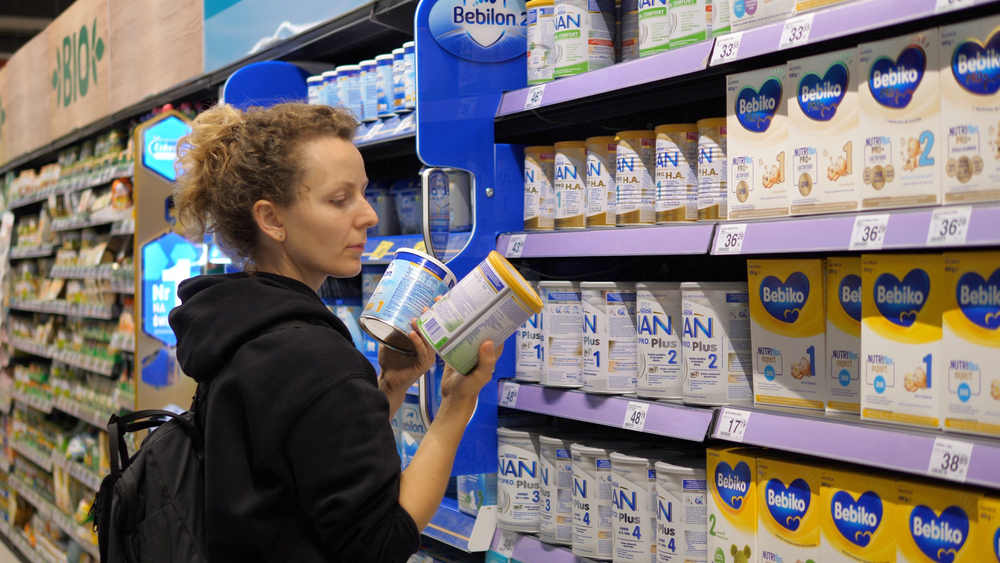In a recent paper published in the Bulletin of the World Health Organization (WHO), we argued that women’s unpaid work needs better recognition through decent time use statistics as well as by counting investments in breastfeeding.
A gender budgeting perspective on the Australian Breastfeeding Strategy highlights that while successive governments are happy to spend money on consultants and the formula industry, they are less willing to invest in the measures to help women with breastfeeding such as better maternity care, longer paid maternity leave, and full implementation of the Code of Marketing on Breastmilk Substitutes. This has implications for planetary health, as well as human health.
It is well known that both women and children’s health benefits from breastfeeding. What is less understood is its importance for environmental health. In a recent special issue of the WHO Bulletin on the economics of health for all, we argued that the lack of visibility of unpaid work such as breastfeeding contributes to gender-blind policies on the environment, as well as a misguided view of what is valuable economically.
A rethink on the global economy and health inequities
Reflecting on the inequities and failures of global governance on the COVID19 pandemic, the Director-General of the World Health Organization commissioned an all-female team to examine the economics of health for all. The WHO Council on the Economics of Health for All included one of the pioneers of feminist economics, Dame Professor Marilyn Waring, as well as UCL professor Mariana Mazzucato an expert in ‘financialisation’ and investment flows. Dr Tedros called for a ‘rethink of what matters’.
During the pandemic, gross inequities in health policy responses became apparent. Women who were pregnant or breastfeeding were not included in COVID-19 vaccine research.
Putting ‘women and children last’ likely harmed their health. Maternity care practices and policies, including in Australia, were poorly aligned with WHO recommendations on breastfeeding during the pandemic emergency.
The WHO efforts to ensure global equity in access to protections and treatments for COVID19 were also undermined by ‘vaccine protectionism’ as high income countries and pharmaceutical companies prioritised populations in countries while using international investor protection and intellectual property laws to block the equitable sharing of research on COVID19 vaccines and treatments.
Meanwhile, the pandemic was overlaid on multiple crises including the glacial response to climate change and related issues including escalating problems of malnutrition and food insecurity and antibiotic resistance.
Maternity care chaos
Early in the pandemic, WHO issued guidance for health professionals indicating that breastfeeding should be protected in maternity care and mothers and newborns should not be separated. Instead, there were egregious violations of women’s and children’s human rights, as health care protocols ignored this advice to prioritise resources away from maternity care and breastfeeding support. In some locations, caesarean section was mandated, and breastfeeding was not permitted. This resulted in needless distress and disruption for new mothers and newborns.
Since that time, research has reinforced the value of breastfeeding in strengthening children’s immune systems, and demonstrating its role in protecting against coronavirus disease. In 2022 WHO and UNICEF leaders emphasised that breastfeeding is the first immunisation, following a study demonstrating that more babies were likely to die from lack of breastfeeding than from COVID19.
While poor data collections mean that the effects of pandemic responses on breastfeeding, infant and child health are not clear, lack of time use data also hinders assessment of the economic burdens of the COVID19 pandemic. Women’s unpaid workloads soared as childcare and schools closed, and healthcare systems came under strain.
The increased productivity of women juggling these additional roles remains unmeasured and invisible to economic policymakers, who missed the opportunity to ‘rethink what matters’, and instead exhorted the importance of ‘back to work’ and ‘return to normal’.
Measuring what matters
At the foundation of measuring what matters is collecting adequate data, and the WHO Council recommendations were built on a call for better time use statistics as the basis for measuring economic burdens and economic productivity. Our proposal for considering breastfeeding investments as a carbon offset is founded in the need for full recognition and appropriate measurement of women’s unpaid work including breastfeeding.
Although it is well established that excluding mothers’ milk production from measures of food production biases policy priorities, most countries (other than Norway) continue to do so. When breastfeeding declines, the economy, as currently measured, expands, because only commercial baby food sales are counted in GDP. The Mothers Milk Tool developed at ANU with Alive & Thrive Southeast Asia Pacific demonstrates the large magnitude of this omission: if women’s production of milk for babies were counted as economically valuable, its monetary value in Australia would exceed $5 billion a year, compared to less than a billion dollars of commercial milk formula.
Our proposal also calls for better time use data, so that who does the work provides the foundation for valuing the economy and for more appropriate distribution of income and wealth.
Investing in what matters – sustainable food systems
Central to our proposal that investments in enabling breastfeeding should count as a carbon offset is the science on the huge environmental impacts of the global dairy industry, of which commercial milk formula products are part. Only quite recently has it been acknowledged that the global food system, and particularly meat and dairy, is a key contributor to environmental damage, through pressures for land clearing, as well as emissions associated with production, distribution and consumption. Recent discussion of sustainable food systems asks whether impacts on animal welfare should also be part of the equation.
Research has shown that as much as 11-14 kilograms of greenhouse gases are emitted during the product life cycle of commercial milk formula. This includes during the production of raw milk with huge methane gas production by cows, through to the processing, packaging and transportation of powdered milk, and the emissions and waste during the consumption and disposal phases of the product life cycle.
Globally, production and use of CMF by infants under 6 months results in annual global greenhouse gas (GHG) emissions of between 5.9 and 7.5 billion kg CO2 eq. and consumes 2,562.5 billion liters of water. If populous countries like China and India were to adopt western feeding practices, the effects on the environment as well as population health would be dire. An infant that is not breastfed generates around a quarter of a tonne of greenhouse gas emissions during the first six months of life, as it requires around 20-21 kilograms of milk powder. Breastfeeding a baby by contrast involves minimal ‘food miles’, even after accounting for ensuring mothers diets are adequate.
This harm to planetary health and early nutrition is avoidable through investments in better maternity care, such as programs which implement the WHO/UNICEF Ten Steps to Succecsful Bresatfeeding, as well as through longer paid maternity leave. These are well evidenced ways of enabling women to breastfeed. Countries like Brazil have shown that integrated packages of breastfeeding support – including community milk banking replacing use of commercial milk formula – can increase breastfeeding rates at country level.
The dairy industry is adept at adapting to new challenges, and the growing phenomenon of ‘greenwashing’ is used to convince consumers that technology can fix the problem by feeding cows seaweed in their diets, or using renewable energy in baby formula factories.
However, this doesn’t help the environment or human health if CMF sales continue to rise. A recent series on breastfeeding in the top medical journal The Lancet documented industry marketing practices which exploit the vulnerabilities and anxieties of new mothers and their families, as well as targeting health professionals and health facilities – seen in the baby food industry as ‘category entry points’. Another study has demonstrated that more than half of CMF sales in the Asia Pacific region are of ‘toddler formula’, which the WHO has stated is unnecessary and possibly harmful to children’s nutrition and health.
Researchers from Ireland, a major dairy exporting country, have shown that achieving global nutrition targets for breastfeeding – for 70% of infants to be exclusively breastfed for the first six months, and for 80% to continue breastfeeding to 2 years and beyond – would do more to reduce greenhouse gas emissions than improving the energy efficiency of CMF production.

Young mother choosing baby formula for her newborn. (Please note: Stock photo)
The Paris Agreement on Climate Change
Global public policy addresses climate change through three policy pillars, mitigation, adaptation and resilience. That is, preventing climate change, getting used to it, and coping with the resulting adversities. Breastfeeding assists all three, through minimising environmental harms, delivering good nutrition and clean fluids and strengthening the immune system, and via its potential to ameliorate the care, nutritional and health vulnerability of infants and young children in emergencies and disasters when usual infrastructure is unavailable. Australia, like other high income countries, has been poorly prepared to protect mothers and babies during such crisis. Ukraine is another tragic example.
Although progress is glacial and inadequate, global agreements for a ‘clean development mechanism’ including a recent ‘loss and damage fund’ have potential to redistribute global development financing to low and middle income countries to tackle climate change challenges.
Our proposal is that countries’ investments in breastfeeding, such as through better paid maternity leave, should be eligible for such funding.
Using the Green Feeding Tool, the impact of such measures on greenhouse gas emissions and water use can be estimated, based on data on infant feeding practices. Maternity care services investments could also contribute. Recognition of the economic and environmental importance of breastfeeding would also help generate improvements in support for women and gender equity.
The transition to a sustainable food system and health for all must be equitable, including for women. Advancing the proposal for investments to better enable women to breastfeed is one important way that will be achieved.
- Julie would like to fully acknowledge her co-authors on the aforementioned academic paper titled A proposal to recognize investment in breastfeeding as a carbon offset: Phillip Baker, Roger Mathisen, Aoife Long, Nigel Rollins, Marilyn Waring
Picture at top: Nicholas Felix/Adobe Stock
Dr Julie Smith (BEc(hons)/BA (Asian Studies), PhD (Econs) is and Associate Professor of Public Health at the University of Canberra's Health Research Institute. She's an awarded Australian Research Council Future Fellow. Her recent research has focussed on feminist economic aspects of breastfeeding and regulation of markets in human milk.





